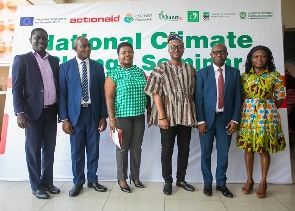Wealthy polluter nations must pay up for climate-induced losses and damages suffered by most vulnerable and poor nations, Country Director of ActionAid Ghana John Nkaw has proposed.
Mr. Nkaw, who was addressing participants at the National Climate Change Seminar in Accra, said millions of farmers in vulnerable countries, including Ghana, are losing their investments due to alarming changes in the climate.
“These sad realities demand our collective action to prevent a further increase in the wealth gap. We must continue our campaign for the establishment of an international financing facility to help vulnerable countries recover and rebuild in the aftermath of climate disasters,” he indicated.
Indeed, Africa suffers most from the ongoing global climate crisis, though the continent is the least contributor to this phenomenon.
Africa only contributes about 3.8 percent of carbon emissions’ global volume, while the western world is responsible for 76 percent.
Since 1960, average annual mean temperature, according to the Ministry of Finance (MoF), has increased by one degree Celsius; with average number of hot days increasing by about 13 percent while the number of hot nights per year has increased by 20 percent.
In 2017 alone, the effects of climate change on agriculture and the environment, according to the MoF, was estimated at US$6.3billion.
A recent report by the African Development Bank states that the continent will need some US$3trillion for climate adaptation programmes by 2030, to enable African economies implement nationally determined contributions.
Already, a World Bank report on Ghana’s climate risk profile states that the country will continue to get warmer – with mean temperature projected to increase by 1°C to 3°C by mid-century, and by 2.3°C to 5.3°C by end of the century.
The report indicates that projected warming will likely occur more rapidly in the northern and inland areas of Ghana.
But Mr. Nkaw explained that regular and varied research on climate change is essential to enhancing stakeholders’ understanding of adaption and helping influence public and private actions to attract investment in vulnerable communities.
“The net effect of ongoing climate change is affecting agricultural production. These changes have impacted negatively on people already living in poverty, who have become vulnerable to prolonged droughts, floods among other climate-induced impacts,” he added.
Vice Chancellor of the University of Energy and Natural Resources, Professor Elvis Asare Bediako, spoke at the event and said the UENR is open to partnering with government and non-governmental institutions – including ActionAid, Care International, the World Bank and others – in the fight against climate change.
The conference’s theme, ‘Building Climate Resilience in Ghana Through Multi-stakeholder collaboration’, was meant to highlight the impact of climate change on smallholder farmers; engage government agencies; and disseminate research findings on Ghana’s climate change situation to influence policy.
Business News of Thursday, 10 November 2022
Source: thebftonline.com













